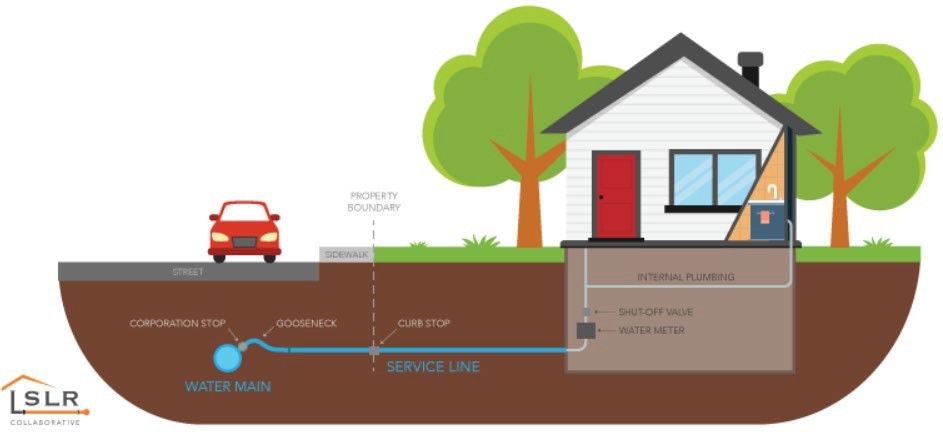- About Dover
- Business in Dover
- City Government
- City Services
- Budget Revealed »
- Building Inspection Services Permits and Forms »
- Current Bids »
- DNTV On Demand »
- Election Information »
- Employment »
- Motor Vehicle Registration »
- Parking Violation Payments »
- Online Permits »
- Planning »
- Pay My Bill »
- Public Library »
- Public Welfare »
- Public Safety »
- Recreation »
- Recycling Center »
- Tax Assessment »
- Vital Records »
- Water/Sewer Billing »
- Contact Us
Water Service Line Inventory
Water service line inventory survey
Per federal U.S. Environmental Protection Agency (EPA) drinking water regulations, City of Dover staff are inventorying all water service lines connected to its public drinking water system to ensure there are no lead is in use within the system. Specifically, the city is tasked with documenting all service line material – public and private sides.
Why is the city creating this inventory?
- To ensure no lead is in use within the City of Dover’s public drinking water system;
- To comply with federal regulations.
The inventory will be published on the City of Dover’s website, with a link posted here when it is.
What is a water service line?
It’s the pipe delivering drinking water from the water main to homes, businesses and schools. It includes a shutoff valve known as a curbstop at the property line that delineates maintenance and upkeep responsibilities.
Who owns the water service line?
 Property owners own and maintain the service line section on their property. Ownership of the curbstop and service line between the curbstop and water main depends on the ownership of the water main.
Property owners own and maintain the service line section on their property. Ownership of the curbstop and service line between the curbstop and water main depends on the ownership of the water main.
- Publicly-owned water mains: On publicly owned or maintained streets, the city owns and maintains the main, curb stop, and service line to the property line.
- Privately-owned water mains: The city does not own or maintain any part of these water mains and service lines, which are found in most private subdivisions governed by a homeowner’s association (HOA). Service line ownership depends on the HOA contract.
Why should I be concerned about lead?
Lead is a toxin that poses serious health risks to all people, but young children, infants and developing fetuses are especially vulnerable to lead exposure. Lead service lines and plumbing materials (including solder, fixtures, and faucets) are the most common lead sources in a home’s drinking water. Galvanized iron or steel pipes can pose risks if ever connected downstream of a lead service line, as lead can attach to the inner surface of galvanized steel and be released into drinking water over time. Service lines made of galvanized iron or steel that are (or were previously) downstream of lead service lines (LSL) are classified as a galvanized requiring replacement (GRR) service line.
Water service line materials
Lead pipes and lead solder were banned countrywide in 1986 by the U.S. Safe Water Drinking Act, and the 1991 EPA Lead and Copper Rule. However, Dover and many other communities across the country already phased lead out decades earlier.
When Dover Water Works was established in 1888, galvanized steel pipes were the standard service line material. Due to its rigidness, pliable lead pipe “goosenecks” connected the galvanized service lines to the main, allowing the seasonal expansion/contraction ground movement. The city believes – though not certain – this practice ended by the mid-20th century, as copper became more available. Since then, the city has utilized copper or drinking water-grade plastic for service lines.
For decades the City of Dover has proactively replaced any known lead material used in service lines, either through the renewing of services in street reconstruction projects or from water leaks, as galvanized services have a propensity to leak. However, there may be instances where lead still exists, often in older homes.
What is my water system required to do now?
- By Oct. 16, 2024: All public water systems countrywide must submit an inventory of the service lines to the appropriate state agency; in Dover’s case, it’s the N.H. Department of Environmental Services (NHDES). Even if all water lines in the drinking water system are non-lead, water systems must still confirm their materials and submit the inventory.
- By Nov. 15, 2024: All public water systems must notify all properties with service lines that contain lead or potentially contain lead. Service lines are considered potentially lead if their material is listed as unknown in the inventory. The city will send notification by mail.
The City of Dover strongly encourages property owners to identify their service line material, especially those where a galvanized service line is still in use.
Want to know more? Subscribe to the City's weekly newsletter, Dover Download. Click Here. Our Web Policy | Site Map | Contact the webmaster